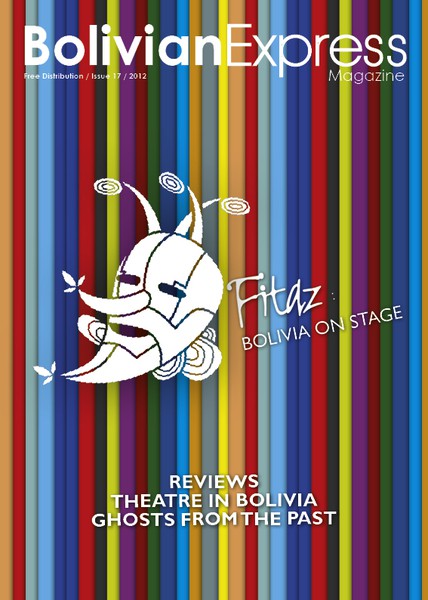
4 out of 5 stars
The FITAZ festival went off with a bang on its first weekend with performances of Mátame, Por Favor on the nights of Saturday 24 and Sunday 25 March in the Espacio el Desnivel theatre space. It was performed by Escena 163, an artistic collective created in 2004 that is known nationally for writing and performing its own theatrical pieces. Mátame, Por Favor was written and directed by the Bolivian playwright and co-founder of Escena 163, Eduardo Calla, an allrounded artist with complementary experience in acting who this year celebrates his 14th year in theatre.
The entire play is set in the room of a 'good guy' who has been taken hostage by two unknown men, and who - from the opening - can be seen tied to a chair facing his neighbours, whom he is forced to watch being tortured. By her dishevelled appearance and terrified expressions, the neighbour woman appears to have been raped. Her husband, with his body covered in bruises, appears to have been violently beaten up. The two antagonists, who are introduced as undercover agents of some type, have unclear motives as to their actions. There is a hint of mystery throughout the entire performance, heightened by the non-specific roles of the performers and powerful, unpredictable and ultimately deafening music.
The small but impressive cast are key in creating an atmosphere in which the audience engages with the different characters and finds themselves, literally, on the edge of their seats throughout the entire performance. Christian Mercado stands out, giving an excellent performance as the head kidnapper and delivering a heart-wrenching monologue whilst demonstrating a sort of evil intelligence and wickedness to his character that holds the dramatic tension of the play. His accomplice, played by Anuar Elías, is perfect for the role of Manuel with his freakish appearance, jittery actions and hilarious tone of voice for the few volatile words he is given. Elías sets the scene early, poised to one side of the stage, looking nervous and apprehensive as the audience is seated. Diego Toledo, playing the 'good guy' victim, has few lines, but he uses his facial expressions and silent mien to convey a frightened, wounded presence. Finally, the neighbours, played by Patricia García and Rodrigo Reyes Ríos: García's presence is fundamental in conveying her character's trauma, with her incessant shouting, crying, and screaming until the audience shares her angst. During the more intense moments of the performance she wails loudly, and other times is completely silent as her kidnapper reads a novel, thereby contributing to the ambiguous ambience of the play.
Eduardo Calla describes his play as a complicated black comedy, risky and very critical of our society. What I enjoyed most was how it effectively conveyed the emotions of fear and terror whilst still fulfilling its comedic nature, mainly through the use of the character of Manuel, as well as the almost-outof- place but effective choice of music. It is a performance full of extremes and contrasts: violence, humour, fear, jokes, and outrage. Above all, it is a drama in which the audience plays an active role fuelled by trauma along with the mysterious nature of the play, which provokes a questioning attitude amongst viewers. Through his own text, Calla gutsily gives a representation of society that isn't all too glamorous, exhibiting the despair, humiliation, and brutality of a not-so-perfect world. Overall, it is a well-executed play with excellent use of music, lighting, and minimalist staging.
4 out of 5 stars
Los B gathers some of Bolivia's most talented actors and throws them together in a script that gives a face to Bolivia's bourgeois of the 1980s. Based on Thomas Mann's novel Buddenbrooks, the play tells a story familiar to modern Bolivia: a once wealthy family, whose fortunes are in decline, in a decade of political, economic and social turmoil. During a family gathering, the characters grapple with death and financial instability, and the changes these bring to their roles in the household. The group left at the end of the play is very different to the family we began with.
The play makes excellent use of the Centro Sinfónico Nacional; set in a basement room of the building, the audience are invited to sit around the scenery, creating an intimate environment that suits the play perfectly. Close proximity to the actors allows every detail of their performance to be scrutinised, and the actors of Los B do not disappoint. Alejandro Viviani's Christian is particularly noteworthy; where others may have neglected to recognise more than a clichéd, clownish figure, Viviani brings comic relief, emotional intensity and sensitivity to the play. However, while personal opinion draws me to his performance, all seven actors shine equally. The beauty of the play is that it allows the audience to choose which cast member to identify with; arguably you need to watch the play seven times, each time focusing on a different performer. It is a credit to the actors' skill that none of them protrude as the protagonist: aspirations to individual stardom are set aside in favour of a cohesive effort for a star ensemble performance.
The play's direction is similarly outstanding. Percy Jiminez, writer and director of the work, leads us through a plethora of sentiments using simple yet effective tools. Barely noticeable details, such as the faint noise of a piano recital upstairs, or a piercing whistle in moments of intensity, guide the audience to the intended emotion. It is a perfect lesson on the effectiveness of subtlety
The script, however, does feel like it is lacking one vital ingredient. The successful strategy in Jiminez's direction – doing so much with little – has not been employed in his script writing. In attempting to address too many issues, it leaves us with too little information. Although enjoyable, it is difficult to define what the work wants to accomplish: ridiculing melodramatic women, exposing the dangers of pushy parents, satire bounds in all directions, and thereby leads us nowhere in particular. In this was the disappointment, yet, it is hard to be negative about a play with such talent on show. Los B is clever, provocative and while not perfect, a pleasure to view.

 Download
Download





















